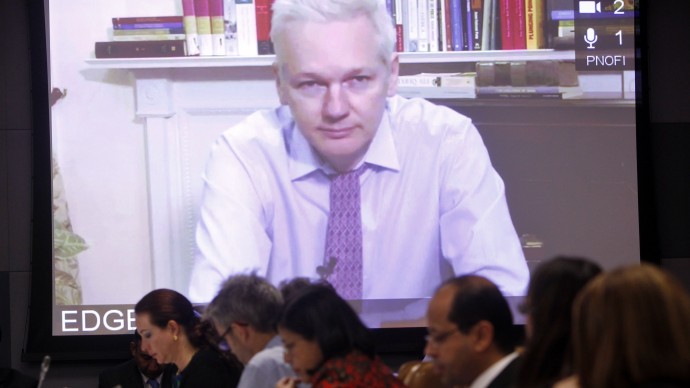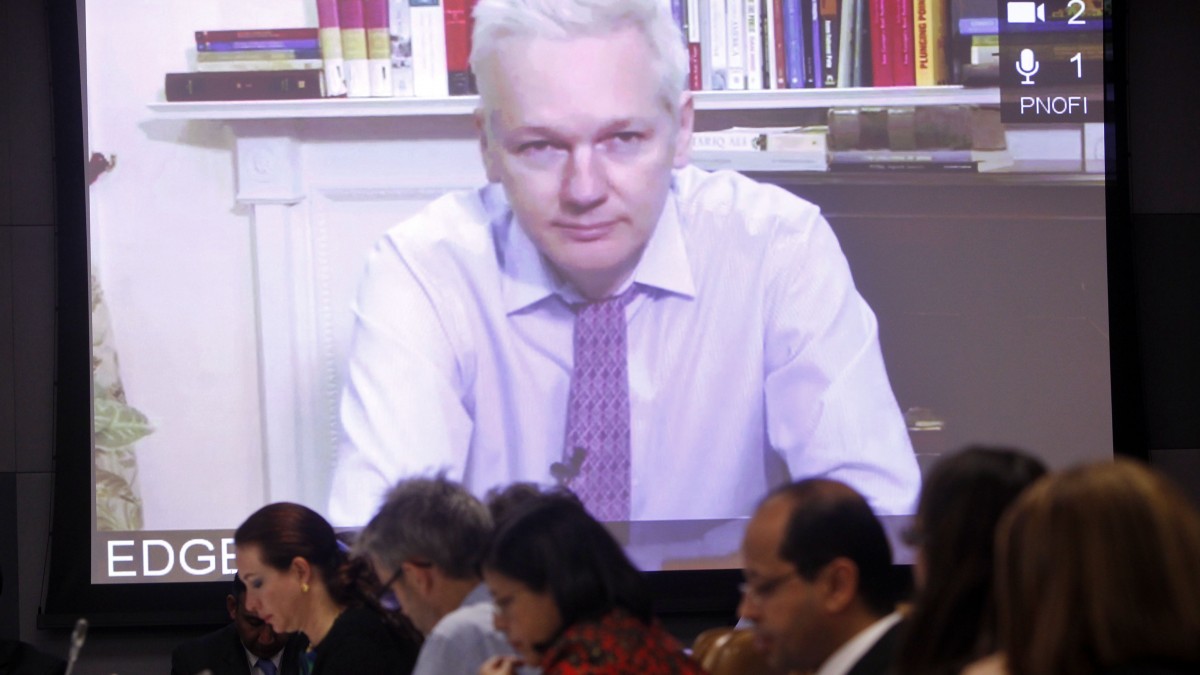
(MintPress) – Online hacktivist organization Anonymous, a longtime ally of disclosure website WikiLeaks, has come out against the controversial publishing trove after WikiLeaks placed its data behind a paywall. While WikiLeaks has not offered reasoning behind its move, its official Twitter page noted that the group is dealing with “high costs in military courts” – something that the Associated Press speculates could be in reference to a possible indictment of WikiLeaks founder Julian Assange to the United States for leaking classified information.
Assange has been at the forefront of discussions anytime WikiLeaks is mentioned, as he was granted political asylum at Ecuador’s London Embassy after a lengthy battle that saw Ecuador say there was the possibility for unjust political persecution. In an online statement, Anonymous spoke out against Assange and the paywall, saying the man has become more than the mission that was launched in 2006.
Over the course of the year, Assange has launched his own web series under the WikiLeaks brand that saw him interview global political figures. He also spent time with musician and entertainer Lady Gaga – something Anonymous claimed to show his celebrity had become larger than the work he initially set out to do.
“We have been worried about the direction WikiLeaks is going for a while. In the recent month the focus moved away from actual leaks and the fight for freedom of information further and further while it concentrated more and more on Julian Assange. It goes without saying that we oppose any plans of extraditing Julian to the USA. He is a content provider and publisher, not a criminal,” Anonymous said.
Funding woes
In the face of mounting legal fees, WikiLeaks says its newly implemented pay structure is necessary. Assange also justified the cost structure to help fund its “publishing and infrastructure costs.” WikiLeaks claims it is funded solely through donations of its site’s users and personal contacts to Assange, but first expressed financial hardship last October. A large part of the implementation of a paywall system is due to a financial blockade once set up against the site from companies such as Visa, Mastercard, Paypal and Amazon.
In response, WikiLeaks filed a lawsuit against both Visa and Mastercard. After nine months of legal battles, WikiLeaks won a ruling in an Icelandic court that ordered the credit card companies to resume processing donations made to WikiLeaks. The Assange-led site believes the economic blockade was instructed by the U.S. in order to halt leaked information, which often contained sensitive data to America.
“This is a significant victory against Washington’s attempt to silence WikiLeaks,” Assange said after the ruling. “We will not be silenced. Economic censorship is censorship. It is wrong. When it’s done outside of the rule of law it’s doubly wrong.”
But the hardship from the reduced donations already made their impact, as WikiLeaks suspended publishing documents to shore up enough revenue to remain solvent through its 18 months of legal battles. The site noted that 95 percent of its donations came through credit card transactions, meaning the crackdown from some credit card companies essentially wiped out funding.
“We are forced to temporarily suspend publishing whilst we secure our economic survival,” WikiLeaks said in 2011. “For almost a year we have been fighting an unlawful financial blockade. We cannot allow giant U.S. finance companies to decide how the whole world votes with its pocket. Our battles are costly.”
Shrouded in secrecy
But what it means in dollars and cents isn’t always clear, as the organization keeps a majority of its finances a secret, according to the Wall Street Journal. According to the publication, WikiLeaks uses German financial network Wau Holland Foundation as a catalyst for its donors. Because of the business partnership, donors to the group cannot be publicly named under German law. And in Germany, WikiLeaks is a registered foundation. But that isn’t the case globally.
“We’re registered as a library in Australia, we’re registered as a foundation in France; we’re registered as a newspaper in Sweden,” Assange has said.
Daniel Schmitt, spokesman at WikiLeaks, said in 2010 that the operational costs for WikiLeaks was around $200,000 per year to cover network fees and storage rentals for servers. And while Schmitt acknowledged that much of the group’s finances are private, he said for the first eight months of 2010, just prior to the lawsuit with credit card companies, WikiLeaks brought in around $1 million in donations.
Some argue, however, that the paywall, which allows the site’s users to donate any amount they desire, is antithetical to WikiLeaks’ initial mission of disclosing relevant and sensitive information. Anonymous, which says the symbol of the paywall will strip WikiLeaks of its most loyal supporters, argued that the site is lost in its celebrity and legal battles instead of fulfilling its mission statement.
“The idea behind WikiLeaks was to provide the public with information that would otherwise be kept secret by industries and governments. Information we strongly believe the public has a right to know,” a statement on behalf of Anonymous said. “But this has been pushed more and more into the background, instead we only hear about Julian Assange. … That’s great for him but not much of our interest. We are more interested in transparent governments and bringing out documents and information they want to hide from the public.”
When operating on a normal output, WikiLeaks has been responsible for leaking hundreds of thousands of classified cables about the U.S.’ involvement in the Iraq and Afghanistan wars, along with the recently published emails of private global intelligence firm Strategic Forecasting (Stratfor).


